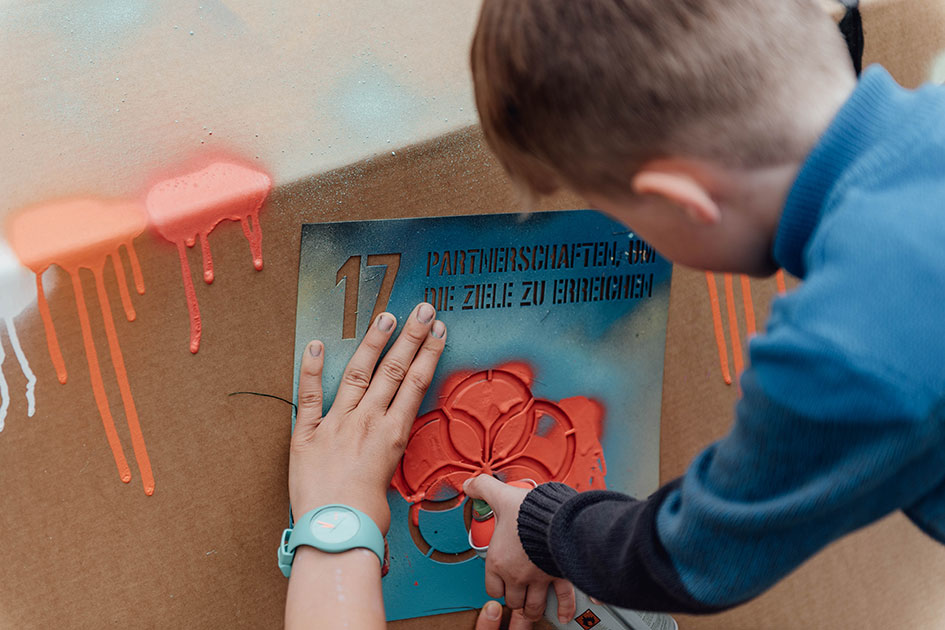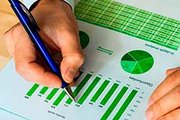Topics
The 2030 AgendaThe Global Goals forSustainable Development
The global challenge of realising a Great Transformation towards sustainability and resilience calls for integrated solutions and worldwide cooperation. The 2030 Agenda is the international road map designed to bring about sustainable and fair socio-economic development and safeguard the future of our planet.
Sustainable development is a term and complex concept that has been discussed by stakeholders in the worlds of science, politics and civil society over many decades. How many aspects can the concept encompass without losing its focus? Is there a generally applicable order of precedence among the various aspects and objectives? And how should conflicting aims be handled?
A consensus has now been reached on the limits within which social and sustainable development can and must take place. These are defined by the ecological ceiling – defended, for example, by the 1.5°C limit set by the Paris Agreement – and the strengthening of the social foundation of basic human needs. The 2030 Agenda for Sustainable Development works with people in mind to seek pathways and innovations that will balance environmental and social development needs and shape sustainable economic models. This view of sustainable development is also reflected in the integrated and holistic strategy pursued by the 2030 Agenda and its 17 Sustainable Development Goals (SDGs) and 169 targets. The Wuppertal Institute has adopted this same approach in its research projects – which contribute directly to the achievement of many of the SDGs – and considers the interactions between the environmental, social and economic aspects of the goals.

The Global Agenda for Sustainable Development
The 2030 Agenda was adopted by the United Nations in September 2015. Although not the first development agenda put forward by the UN, it is the first claiming to be universal and thus declaring all countries of the world to be in need of development. Unlike their predecessor, the United Nations Millennium Declaration, which combined all environmental challenges into one overarching goal, the SDGs therefore contain not only social and economic objectives but also a series of specific targets to keep development within the environmental limits.
Since 2015, the 17 SDGs set out by the 2030 Agenda have come to represent the efforts to make global development socially and economically beneficial, sustainable and equitable. They provide a valuable compass for responsible, transformative science and thus for the work of the Wuppertal Institute. It falls to policymakers, civil society, business and the scientific community to develop measures and tools that address local, regional and national circumstances and requirements.
Consistent Implementation at all Levels of Politics
The 2030 Agenda must be implemented consistently at every political level – from global to local. With the system of targets established by the 2030 Agenda, governments and ministries have been provided with an improved compass to guide this process, which continues to inform the sustainability strategies of Germany's federal government as well as those of some of its individual states, municipalities and regions.
But putting the 2030 Agenda into practice across all levels is no small task. The process calls not only for interdisciplinary knowledge but also for far-reaching cooperation as, to be truly effective and efficient, the strategies and measures pursued at different political levels must be interconnected and complementary. A high degree of vertical coordination in the federal system is thus required. Sustainable development in the context of the 2030 Agenda concerns various areas of policy and must therefore be implemented jointly by all departments of government. This poses a major challenge to staff in ministries and public administrative bodies to find suitable spaces for effective cooperation and innovation across departmental boundaries.
The Wuppertal Institute has been supporting municipalities, individual states and the German federal government in this regard for many years. For example, the Wuppertal Institute has been providing scientific guidance to the state government of North Rhine-Westphalia (NRW) since 2013 to assist in the preparation and implementation of its sustainability strategy. The Institute also supports the work of the Sustainable Development Solutions Network (SDSN) Germany and the Science Platform Sustainability 2030 (wpn2030) in terms of personnel and concept development.
Scientific Research and Education Are Essential
In order to review the success of these efforts, the scientific community can and should play a role in selecting suitable indicators. The Wuppertal Institute develops proposals for assessing progress in sustainable production and consumption and the transformation of the transport sector. The sustainability of public investments and financial markets is another growing area of focus for the Institute’s research. The Wuppertal Institute’s scientists consider the systemic connections and their interactions by looking for synergies between an integrated approach to sustainability, climate protection and the energy transition. In doing so, they explore questions like: what does a sustainable structural policy involve? What impact is decarbonising industry having on industrial regions? What is the connection between gender relations and climate protection? And how can energy poverty be prevented?
Furthermore, it is important to disseminate the knowledge that has been gained. High-quality education is not only one of the 17 goals, it is also an important building block when it comes to sharing Zukunftswissen, or future knowledge, both in the formal education system and in the context of Education for Sustainable Development (ESD). For the latter in particular, the Institute has developed a variety of concepts designed for specific target groups in recent decades.
Development Needs the Courage to Experiment
Far-reaching changes to the system are necessary if social and economic development is to be realised within environmental and social limits. The (further) development of technological innovations is needed – but this alone is not sufficient. What is required is a fundamental realignment of social, economic and political behaviour towards an understanding of prosperity that – based on human needs – does not jeopardise adherence to environmental limits and integrates the goals of the 2030 Agenda. We can only meet this challenge by empowering people as individuals as well as society and its institutions as a whole to find their bearings in complex transformation processes and help shape necessary solutions. As an Institute, we make the necessary spaces for experimentation available, such as in the form of real-world laboratories or living labs, thereby allowing solutions to be sought and tested.

In order to cope with the complex challenges of our time, which the 2030 Agenda throws into sharp relief, members of the public need a mix of skills and knowledge to provide them with orientation, ensure they understand the issues and equip them to help shape our future.
Topics
You find more information on the SDGs here:
News
Here you find up-to-date information on research findings and activities.
News on the topic

Wuppertal Institute Mourns the Loss of Professor Akio Morishima
Former member of the International Advisory Board passes away at the age of 89

Extending Smartphone Lifetimes: How We Can Cut Emissions in Half
Wuppertal Institute's discussion paper offers a first comprehensive overview of the entire smartphone lifecycle

Pathways towards a Green Economy in Egypt
Analysis of three Egyptian value chains and recommendations for environmentally friendly business practices published
Publi-cations
You find all scientific publications on our publication server:
Projects
Here you find research activities in the field of SDGs. A complete list is available here.
